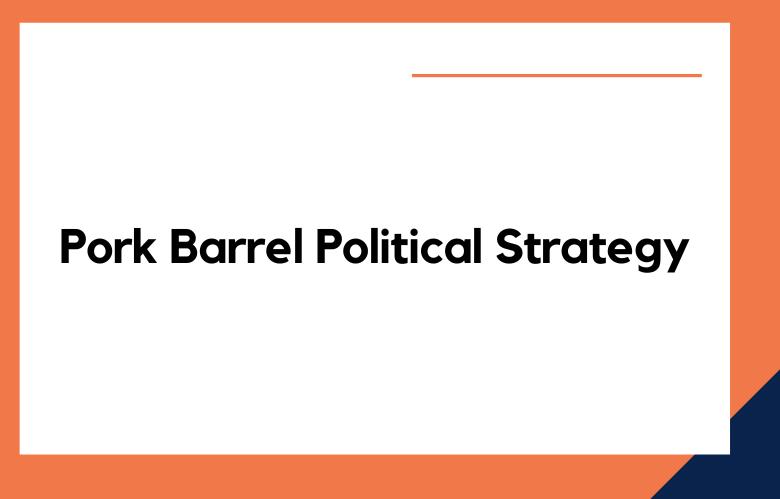Have you ever heard of the term pork barrel? It’s a term used to describe a political tactic where politicians secure funds for their district or state to gain favor with their constituents. This tactic has been around for many years and has been used by politicians of all parties to win elections and stay in power. But is pork barrel politics still effective today? We’ll look closely at pork barrel politics and its effectiveness in today’s political landscape.
Pork barrel politics has been a part of American politics for centuries. Earmarks, or special provisions in legislation that direct funds to specific projects or programs, were the primary way pork barrel politics was implemented. However, in 2011, Congress passed a ban on earmarks, which has limited the ability of politicians to use pork-barrel spending as a political strategy.
The Ins and Outs of Pork Barrel Political Strategy
Pork barrel politics is an age-old phenomenon that many people do not understand. It is a political strategy that involves the distribution of government funds to influence legislators and secure votes for future elections.
While it may seem like a fair strategy for politicians, the real issue stems from the unfair distribution of funds. We will delve into what pork barrel politics entails, why it is controversial, and how it affects citizens.
Pork barrel politics involves allocating government funds to specific projects in certain areas by legislators, with a motive to gain political support from voters in a particular region.
These funds are meant to increase economic growth, improve infrastructure, and enhance social services. However, the distribution of the funds can be biased since politicians tend to favor their constituencies or wealthy donors, leaving out the areas that genuinely need the funds.
The Dangerous Relationship Between Pork Barrel Politics and Corruption
Pork barrel politics is a strategy politicians employ to use government funds, projects, or services to benefit a specific group or district within their constituency.
While this is an effective way to gain political support, there are also inherent risks and negative consequences associated with pork barrel politics. We will discuss the dark side of pork barrel politics and its relationship with government corruption.
One of the most significant risks associated with pork barrel politics is its reliance on allocating funds from the government’s budget.
Politicians, therefore, need to ensure that they are re-elected to maintain the funds that they have gained. This focus on “winning at all costs” often incentivizes politicians to engage in corrupt activities, such as vote-buying, bribery, and manipulation.
The Dark Side of Pork Barrel Politics: A Strategy That Comes at a High Cost
The term “pork barrel politics” is used to describe a political strategy that involves the use of government funds to support specific projects or initiatives in a particular district or state.
While this approach may seem like an excellent way to bring resources and support to needy communities, it has earned a reputation as a corrupt and inefficient means of allocating resources.
We will take a closer look at what pork barrel politics is, why it is so controversial, and what its impact on democratic institutions and society has been. But before we delve into these critical issues, let’s first define what pork barrel politics is.
Case Studies of the Pork Barrel Political Strategy
There are several examples of pork barrel infrastructure projects that have been funded over the years. One example is the famous Alaskan “Bridge to Nowhere” project, which aimed to build a bridge that connected a small town to an airport.
The project was shelved after it came to light that it would cost taxpayers over $400 million despite serving only about 50 residents.
Another example concerns the City of Bell in California, where elected officials embezzled millions of dollars in pork barrel funds through various schemes. They did this by inflating salaries, unlawfully granting sick thyme, and paying themselves for meetings they never attended.
Advantages of the Pork Barrel Political Strategy
There are numerous benefits of the pork barrel political strategy that politicians may leverage for their use. First, it allows them to fulfill their campaign promises, increase visibility, and improve their reputation among constituents.
Second, the strategy is geared towards increasing local economic activity, which generates indirect and direct revenue for the government. Third, the system ensures that the elected officials respond to the needs of their communities.
Fourth, pork barrel spending can benefit the country by enhancing local development and promoting economic growth in underdeveloped areas.
Disadvantages of the Pork Barrel Political Strategy
Despite its advantages, there are also several significant disadvantages associated with pork barrel spending.
The first and most common criticism is that this type of spending is wasteful because funds are allocated based on political motivations rather than actual needs. Second, the strategy often leads to corruption and misconduct, as elected officials can use these funds to bolster their re-election campaigns.
Third, the funds are often distributed disproportionately, with some areas receiving more significant investments than others. This can create resentment among constituents and undermine the argument that pork barrel funding is fair.
Understanding the Pork Barrel Political Strategy: Its Impact on Democracy
Politics has always been a complicated matter to discuss. It is the constant struggle for power and the continuous manipulation of the masses to support a candidate’s agenda.
One of the most controversial political strategies today is the pork barrel strategy, where the government appropriates funds for a project in a particular district to gain that district’s support. While it has been practiced for years and is considered a common political strategy, society is questioning its democratic foundation.
Defining Pork Barrel Politics-
Pork barrel politics refers to appropriating government funds to a particular region or district to benefit that region. In other words, this type of strategy involves politicians earmarking money for a specific project that only helps a minority.
The Pros of Pork Barrel Politics-
Pork barrel politics are not inherently harmful. It can help local communities grow, create jobs, and enhance the standard of living of its people.
This strategy is particularly useful in developing economies and regions with insufficient resources. Elected officials and their teams can use the pork-barreling approach to bring the issue they care about to everyone’s attention.
The Cons of Pork Barrel Job Destruction-
The primary concern with pork barrel politics is that it can lead to the destruction of jobs. It entails an uneven distribution of resources and expenditures, so some communities benefit over others.
It often comes at the expense of other projects that could benefit more people, such as infrastructure, healthcare, and education. This strategy is also susceptible to corruption, as officials can award contracts to their cronies or supporters, leading to subpar infrastructure.
The Effects of Pork Barrel Politics on Democracy-
Pork barrel politics lead to ill-informed decisions in a democratic society. In a representative democracy, individuals are elected to represent and concentrate extensive power of decision-making in themselves.
They distribute limited resources and taxpayer money at their discretion. If not exercised appropriately, they can abuse their power, promote personal gain, and overlook the democracy’s interest. These actions can only lead to the deterioration of a democratic society and, therefore, require reconsideration.
Conclusion:
Pork barrel politics has been a part of American politics for centuries, but its effectiveness has been reduced recently due to the earmark ban.
However, politicians have found other ways to secure funding for their districts or states, which can still help them win elections.
While some argue that pork barrel politics can be wasteful and inefficient, others point to its ability to bring resources and funding to areas that need it most. So, is pork barrel politics a thing of the past? It may not be as prevalent as it once was, but it still has the potential to play a role in the political landscape.
Call: +91 9848321284
Email: [email protected]











